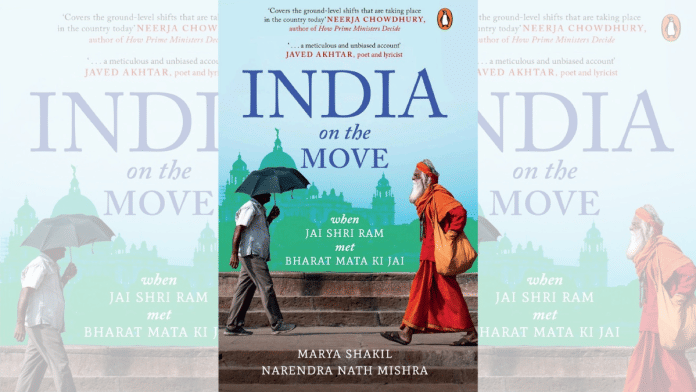In a profound exploration of contemporary Indian political discourse, Marya Shakil and Narendra Nath Mishra delve into the intricacies of nationalism, protest and identity in their new book ‘India on the Move: When Jai Shree Ram Met Bharat Mata ki Jai’.
The narrative begins amid a charged atmosphere of Jawaharlal Nehru University (JNU), where protests against the judicial hangings of Afzal Guru and Maqbool Bhat sparked a defining moment in the nation’s collective consciousness. What started as an academic discourse rapidly metamorphosed into a complex landscape where student researchers were suddenly recast as ‘jihadis’, ‘violent communists’, and ‘anti-nationals’.
At the heart of the book lies a critical examination of two powerful political slogans: Bharat Mata ki Jai and Jai Shree Ram. Once distinct expressions of national reverence and religious salutation, these phrases have been dramatically reappropriated, converging into potent political symbols that reveal deep ideological fissures within Indian society.
Neerja Chowdhury, author of ‘How Prime Ministers Decide’, notes, “I have known Marya Shakil for many years and seen the way she has grown into a skilled political reporter, anchor and analyst. She has covered the ground-level shifts taking place in the country today and tracked the high-level machinations in the corridors of power. It has led her to capture the two competing narratives dominating the country today.”
Renowned poet and lyricist Javed Akhtar describes the book as “a compelling time-travel journey through a decade of pivotal events that have shaped India’s political and social landscapes”. According to him, “The authors deliver a meticulous and unbiased account, allowing readers to draw their own conclusions about the impact and significance of these moments.”
The authors masterfully navigate the tension between two competing visions of nationalism. On one side stand those who equate patriotism with unquestioning conformity and blind obedience. On the other, a perspective that champions a more inclusive and diverse India, where dissent and criticism are not just tolerated but essential to a functioning democracy.
India on the Move is more than a political analysis; it is an exploration of the complex forces that shape contemporary Indian society. It challenges readers to reconsider their understanding of nationalism, dissent, the meaning of democratic participation, and promises to be a landmark work that captures the pulse of a nation in transformation. Published by Penguin India, ‘India on the Move’ will be released on 17 December on SoftCover.
Marya Shakil is a senior journalist with nearly 18 years of experience closely covering the Indian political landscape. Her insightful reporting has earned her multiple awards, including the prestigious Ramnath Goenka Award for Politics and Government. Narendra Nath Mishra, a seasoned senior journalist with nearly two decades of media experience, is renowned for his insightful observations on India’s socio-political landscape. He has held key editorial roles in various prominent media organizations, contributing significantly to journalism.
Also Read: New book explores the travels of ordinary Indian migrants in Colonial India







Why is the focus solely on “Jai Shree Ram” and “Bande Mataram”?
Why is “Nara e takbeer ..”, “Assalam alaikum”, “Tera mera rishta kya …..”, etc. not under focus?
Was it not the Muslim League which insisted on the Partition? Did slogans like “Lar ke lenge Pakistan” have no malice?
The Print’s review of the book shows how far to the Left it has shifted in recent times. Accusing one side of “blind obedience” while eulogising the other for being “champions of inclusive and diverse India”.
Is supporting Afzal Guru and Maqbool Bhat a pre-condition for being categorised as an inclusive person?
Since when did celebrating convicted terrorists hanged on judicial orders become the cornerstone of a “diverse” India?
This article is shameful. I hope Mr. Shekhar Gupta takes note of this article and initiates a course correction. Otherwise, The Print is well on it’s way to being the next Newslaundry.
The Print has shifted decisively to the Left in its reportage. A sample from this article serves as an example – “On one side stand those who equate patriotism with unquestioning conformity and blind obedience. On the other, a perspective that champions a more inclusive and diverse India, where dissent and criticism are not just tolerated but essential to a functioning democracy.”
The sentences reek of bias and prejudice. It’s absolutely clear that the journalist/editor who wrote these lines considers every right-of-centre person as an “Andhbhakt” – a pejorative term used to describe supporters of Modi/BJP/RSS.
While the “other side” – presumably the Left-liberal cabal – is a champion of “inclusive and diverse India, where dissent and criticism are not just tolerated but essential”. So the Left-liberal supporters are a bunch of progressive saints who are “inclusive” and stand for freedom of speech, rule of law and justice.
Such reportage in The Print is the reason why I am no longer a paid subscriber.